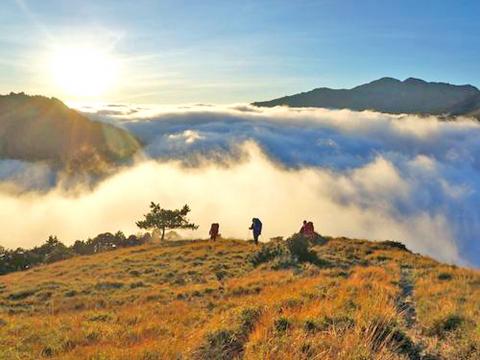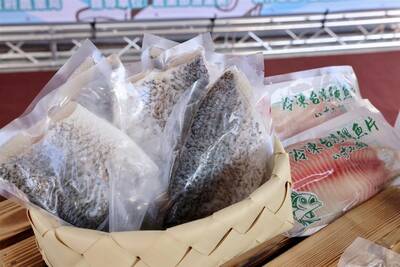Mountaineer Lin Yi-hua (林乙華) has traveled to distant parts of the globe to explore some of the world’s best-known mountain ranges. However, even after hiking and climbing in India, the Caucasus region, Kyrgyzstan, Argentina and South Korea, nothing mesmerizes her more than the peaks in Taiwan.
“When you’re on the top of a mountain [in Taiwan], what hits your eyes instantly are layers and layers of volatile clouds,” Lin said. “The spectacle sticks in your mind and lingers there even when you are scaling mountains overseas.”
That sentiment has many in Taiwan hopeful that its mountains will become a draw for nature lovers and mountaineers from overseas.

Photo: CNA / Lin Yi-hua
Those who have already enjoyed high-altitude journeys have been impressed, said Lin, who runs a nature exploration company called Base Camp that provides professional guiding services to amateur climbers and hikers in Taiwan.
A mountain guide for 10 years, Lin said the most common response to mountaintop views she gets from foreign clients is an emphatic “wow.”
There are plenty of vistas to choose from. Hills and mountains account for two-thirds of Taiwan’s terrain, and the island has 200 mountains of more than 3,000m high. Many of its forests are pristine and have barely been explored.
Packed with ecological and biological diversity, the mountain ranges offer visitors different landscapes and climates within short distances when hiking from altitudes of 1,000m up to beyond 3,000m.
This incredible beauty and diversity might be a well-kept secret outside the nation, but it actually offers a unique experience that should be attractive to foreign visitors, said Pascale Schmied from Switzerland, who lived in Taiwan for seven years before returning home last year.
A hiking enthusiast, Schmied climbed 53 mountains more than 3,000m high while living in Taiwan.
In an interview last year, she said she found the “primitive state” of Taiwan’s mountain ranges and forests “alluring,” especially in contrast with her own country.
Given Switzerland’s public transportation network and mountain infrastructure, it is easy for hikers there to locate villages offering cozy shelters and warm meals in mountainous terrains, Schmied said. Not so in Taiwan, which is part of its appeal, she said.
Chinese Taipei Alpine Association (CTAA) secretary-general Robert Song said outdoor enthusiasts from nearby countries, especially Japan, are attracted to Taiwan because the island has more tall mountains than Japan and its mountain ecology is more diverse.
There are also better and more challenging mountain hiking and river trekking opportunities available, Song said.
Lin added another factor: Colorful culture adds zest to natural settings.
Signs of human heritage, including Aboriginal communities scattered through the mountains and relics and old trails, some of which originated during the Japanese colonial period, bring the terrain to life, Lin said.
No statistics are available on the number of people who come from abroad to explore Taiwan’s mountains, but Song said it is a few thousand, including about 300 Japanese and South Koreans who apply to the CTAA for mountain hiking tour services annually.
He said there is considerable potential for the numbers to go higher, because most people from abroad have only experienced developed national parks or the most popular mountain trails.
“There are vast mountain resources in Taiwan that have yet to be developed or considered for tourism,” he said.
However, several barriers exist to turning Taiwan’s majestic peaks into draws.
The permit system for access to protected areas of national parks is complicated at times and can make it difficult for people to make plans.
There is also a lack of mountain huts in most mountain areas outside the well-managed national parks to provide shelter to hikers wanting a rest or seeking shelter from sudden weather changes, Lin said, and the few that exist are mostly simple sheds without even toilet facilities.
Language can be a barrier affecting foreigners because there is little English-language information on most of Taiwan’s mountain trails, the 41-year-old Lin said.
Lin and Song agree that Taiwan’s mountains have not been systematically managed since Japanese colonial rule ended in 1945, but they also believe that mountains and forests are unpolished gems with plenty of potential in the tourism market.
What makes mountains and forests valuable is their primitive state, Lin said.
“The era of geographic exploration might have passed, but the exploration of nature’s face will never end,” she said.

Taiwan's Vice President Hsiao Bi-khim (蕭美琴) said Saturday that she would not be intimidated by the Chinese Communist Party (CCP), following reports that Chinese agents planned to ram her car during a visit to the Czech Republic last year. "I had a great visit to Prague & thank the Czech authorities for their hospitality & ensuring my safety," Hsiao said on social media platform X. "The CCP's unlawful activities will NOT intimidate me from voicing Taiwan's interests in the international community," she wrote. Hsiao visited the Czech Republic on March 18 last year as vice president-elect and met with Czech Senate leadership, including

There have been clear signs of Chinese Communist Party (CCP) attempts to interfere in the nationwide recall vote on July 26 in support of Chinese Nationalist Party (KMT) legislators facing recall, an unnamed government official said, warning about possible further actions. The CCP is actively involved in Taiwanese politics, and interference in the recall vote is to be expected, with multiple Chinese state media and TAO attempts to discredit the Democratic Progressive Party (DPP) and undermine public support of their recall movement, the official said. This interference includes a smear campaign initiated this month by a pro-Beijing Hong Kong news outlet against

A week-long exhibition on modern Tibetan history and the Dalai Lama’s global advocacy opened yesterday in Taipei, featuring quotes and artworks highlighting human rights and China’s ongoing repression of Tibetans, Hong Kongers and Uighurs. The exhibition, the first organized by the Human Rights Network for Tibet and Taiwan (HRNTT), is titled “From the Snowy Ridges to the Ocean of Wisdom.” “It would be impossible for Tibetans inside Tibet to hold an exhibition like this — we can do it. because we live in a free and democratic country,” HRNTT secretary-general Tashi Tsering said. Tashi Tsering, a Taiwan-based Tibetan who has never

A first shipment of five tons of Taiwan tilapia was sent from Tainan to Singapore on Wednesday, following an order valued at NT$600,000 (US$20,500) placed with a company in the city. The products, including frozen whole fish and pre- cooked fish belly, were dispatched from Jiangjun Fishing Harbor, where a new aquatic processing and logistics center is under construction. At the launch, Tainan Mayor Huang Wei-che (黃偉哲) called the move a “breakthrough,” marking Taiwan’s expansion into the Singaporean tilapia market. Taiwan’s tilapia exports have traditionally focused on the United States, Canada, and the Middle East, Huang said, adding that the new foothold in